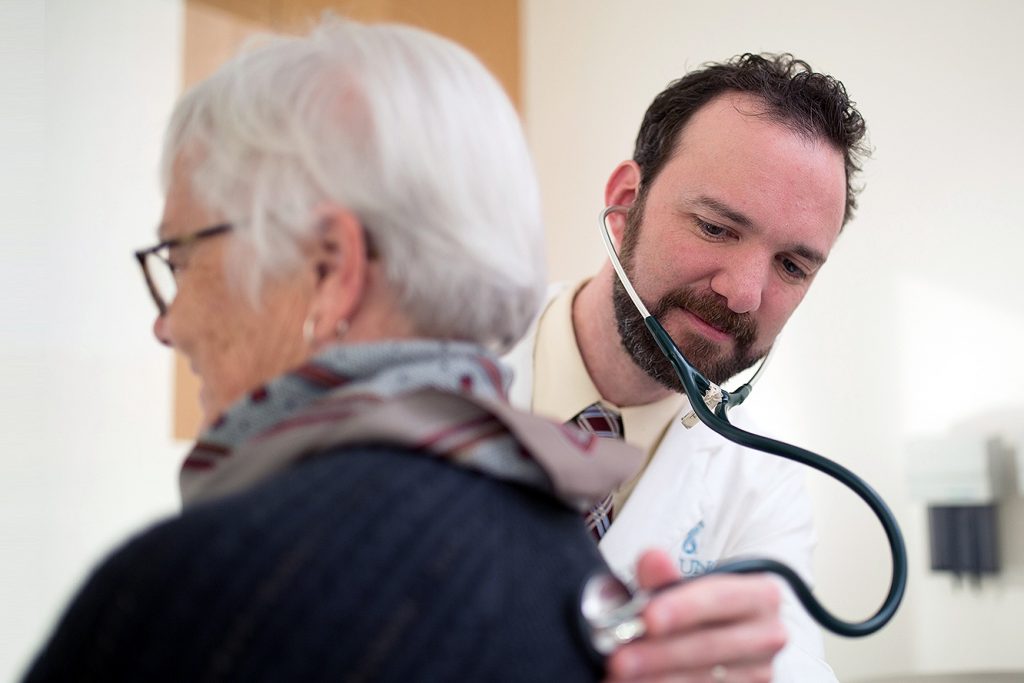Multiple Myeloma, Amyloidosis and Related Disorders
The Multiple Myeloma and Amyloidosis program has moved to UNC Hospitals Hillsborough Campus, located at 430 Waterstone Dr., Hillsborough, NC 27278.
The following providers have moved to the new location:
- Sascha Tuchman, MD, MHS
- Samuel Rubinstein, MD
- Eben Lichtman, MD
- Nurse Practitioner Martha “Dell” Strayhorn, MPH, FNP-C
- Nurse Practitioner Teresa Sadiq, APRN, BC
Please call (984) 974-0000 if you need further information or have any questions.
UNC Lineberger Comprehensive Cancer Center’s Multiple Myeloma & Amyloidosis Program treats multiple myeloma, amyloidosis and other plasma cell-related disorders such as solitary plasmacytoma, POEMS syndrome, monoclonal gammopathy of uncertain significance (MGUS), asymptomatic “smoldering” myeloma and Castleman’s disease.

UNC’s Multiple Myeloma & Amyloidosis Program offers patients and referring physicians access to a complete range of both diagnostic and therapeutic services for multiple myeloma and other plasma cell disorders. These include chemotherapy, radiation therapy and stem cell transplantation. Multiple specialists are part of our team, helping you manage side effects and symptoms of your condition and treatment side effects.
Multiple myeloma and other plasma cell disorders are problems of plasma cells, and in fact some, such as multiple myeloma, are a true cancer of the plasma cells. Plasma cells are found in bone marrow, which is the space inside bones where blood is made. In multiple myeloma and other plasma cell disorders, abnormal plasma cells grow in the bone marrow. Those plasma cells also usually produce an abnormal protein (often called a monoclonal protein, M-protein, M-spike, or “light chains”). The plasma cells and/or the abnormal protein can cause damage.
Amyloidosis is a disorder in which abnormal proteins stick in different organs in the body, causing damage. Some forms of amyloidosis come from abnormal plasma cells and are related to multiple myeloma, but other forms of amyloidosis, such as the transthyretin type, come from completely different sources. Figuring out the source of amyloidosis in an individual patient, meaning establishing a correct diagnosis, is critical to managing amyloidosis correctly. Read more information about amyloidosis
Due to the complicated nature of these disorders, our multidisciplinary approach, with input from experts from a number of specialties, allows us to excel in treating these patients. We ensure that expertly developed care is individualized for each patient and delivered in a well-coordinated and caring manner by incorporating specialists from hematology, medical, radiation oncology, pathology, UNC Imaging and Spine Center, the Bone Marrow Transplant and Cellular Therapy Program, radiology, and oncology nursing into a single patient care team.
Appointments & Questions
Call (984) 974-0000 to make an appointment, to refer a patient or to speak with an operator who can direct your call
(Available 8 a.m. – 5 p.m. ET, Monday – Friday)
The Myeloma Clinic is located at UNC Hospitals Hillsborough Campus, located at 430 Waterstone Dr., Hillsborough, NC 27278.
The Amyloidosis Clinic is also located at UNC Hospitals Hillsborough Campus, although some of our specialists are based at other locations.
